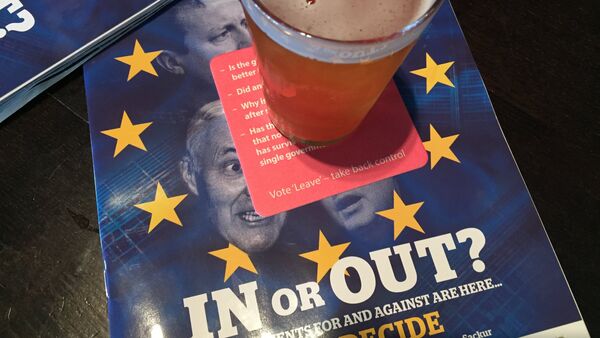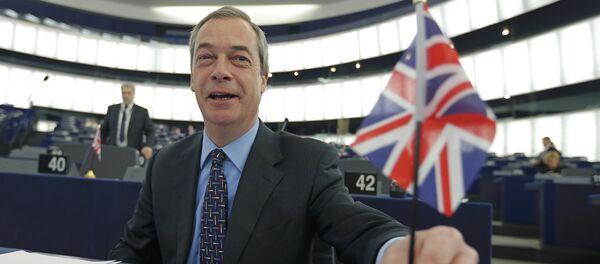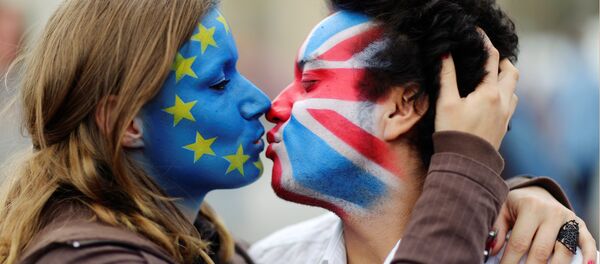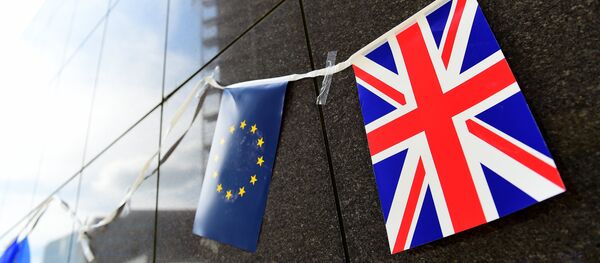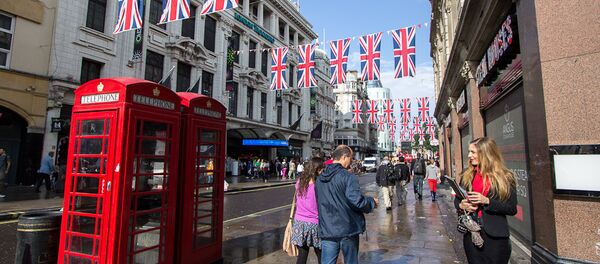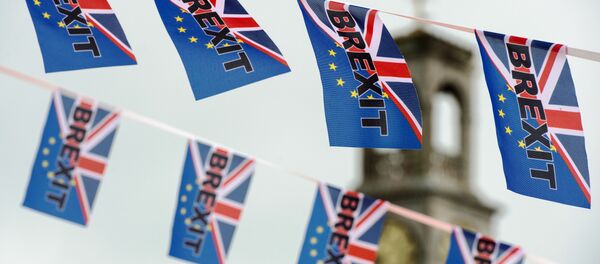MOSCOW (Sputnik), Ivan Kuzevanov and Daria Chernyshova — While the Leave campaign claims that a Brexit would give a huge boost to local business, economic forecasts predict recession and plummeting turnover as the most likely outcome of the United Kingdom's possible self-imposed exile from the European Union.
If the Conservative government’s efforts to win the referendum debate turn out to be futile, it will have to face the consequences of being shut out of the European single market: doubt being cast on London's status as the leading international financial hub, on existing trading pacts in place between the United Kingdom and other states, on the stability of its national currency and the future buoyancy of export-oriented sectors of the British economy.
OUTSIDE THE SINGLE MARKET
Although the Leave camp is trying to convince the British public of the opposite, the United Kingdom will not be able to retain full access to the single market while simultaneously refusing to comply with Article 45 of the Treaty on the Functioning of the European Union, which obliges member states to ensure the free movement of workers within the bloc — Leave campaign’s the main argument for Brexit.
Brussels’ stance on the issue was made clear in June by German Finance Minister Wolfgang Schaeuble who rejected the idea that a post-Brexit United Kingdom could continue to enjoy the benefits offered by the single market.
Meanwhile, UK foreign trade is highly dependent on the European Union, as the bloc accounted for 44 percent of UK exports and 53 percent of imports of goods and services in 2015. The bloc is also a major source of inward investment in the United Kingdom, amounting to 48 percent of total inward FDI to the country in 2014 while, according to a EY survey, the United Kingdom attracted more FDI projects than any other EU member.
Markets on #Brexit. pic.twitter.com/TnC4O6BTi5
— Pedro da Costa (@pdacosta) 20 июня 2016 г.
According to Thomas Sampson, assistant professor at the Department of Economics, London School of Economics and Political Science (LSE), an exit scenario would hit the country's economy really hard. Talking to Sputnik, he referred to a study carried out by LSE's Centre for Economic Performance in which it was forecast that UK per capita GDP would decrease by between 6.3 and 9.5 percent in the long-run in the event of Brexit.
"Loss of access to the Single Market would reduce the UK's trade with the EU and lead to lower GDP per capita in the UK," he said.
[INTER]NATIONAL FINANCIAL CENTER
Several senior executives of major financial companies have already confirmed Brexit would put London back decades because of the invalidation of the London-based companies' passports to offer financial services in EU member states, which will push them to relocate outside the United Kingdom.
This exodus could seriously damage the industry, which currently accounts for some 10 percent of the country's GDP and 12 percent of tax revenues.
Voters in key EU countries fear #Brexit would hurt them economically https://t.co/oSQ7kBoPlx pic.twitter.com/6qryrNiJz3
— Gergely Polner (@eurocrat) 8 июня 2016 г.
However, Patrick Minford, professor of applied economics at Cardiff Business School, is certain that British exports of financial services will not suffer because he believes even if there is less business inside the European Union, London will do more in other world markets.
"If the EU is less cooperative and so the price of London financial products rise in the EU, this will make no difference to the world price of financial products because it will have a very small effect on demand relative to the whole world market demand. So London's output will be the same as it will sell less in the EU, more elsewhere. Financial trade will be diverted from EU to the rest of the world," Minford concluded".
TRADE AFTER BREXIT
The Leave camp offers multiple post-Brexit scenarios to mitigate potential losses arising from the move or even to exploit the United Kingdom’s new status of being outside the bloc. Some of the options include joining the European Free Trade Association, currently consisting of Iceland, Liechtenstein, Norway, and Switzerland, that would allow the United Kingdom to continue enjoying trade benefits with the European Union and conduct separate negotiations with third countries, such as China.
However, experience of trade negotiations shows that the process usually takes years, making British prospects of reaching new trade agreements to substitute treaties that cover the country as part of the bloc in the short-to-medium term unlikely.
Iain Begg, professorial research fellow at LSE’s European Institute, expects that it could take the United Kingdom up to two years to fully exit the European Union since Article 50 of the Lisbon Treaty stipulates that a member state must first file a withdrawal notification with the European Council before even considering potential trade treaties to substitute current arrangements.
"The evidence is that they [such exit procedures] take longer than claimed by Leave campaigners," Begg told Sputnik.
According to Swati Dhingra, lecturer in the Department of Economics at LSE, even if London begins separate free trade talks with Washington, the United States is unlikely to prioritize its negotiations with the United Kingdom over the Trans-Pacific Partnership deal, its agreement with ASEAN, and TTIP.
"General experience suggests that any country that negotiates alone with the US don’t quite get the deal that they want which is why most of us think the UK should stay with the EU and let the EU negotiate on its behalf, because it is likely to get a better deal," Dhingra told Sputnik.
[MIS]ALLOCATION OF BRITISH RESOURCES
One of the strongest arguments of the Leave campaign is the allocation of British resources to EU institutions, systematically rising in real terms since 1973. In 2014, the United Kingdom’s net contribution to the European Union amounted to 9.8 billion pounds with this figure forecast by the HM Treasury to reach 11.1 billion in 2016.
"We can start elevating the poverty that exists in our cities, poverty caused by low wages, we can start investing in our own country, we can protect our own industries, we can do so much outside the EU," Oulds told Sputnik.
However, a major part of these funds actually make their way back to the United Kingdom as part of the EU-wide programs or are spent on causes that otherwise would be financed by the British budget one way or another. For example, London pledged to spend 0.7 percent of its Gross National Income on overseas aid, and in 2014 spent 816 million pounds to finance EU Official Development Assistance Budget which counted toward that target.
Drawing a line, LSE's Iain Begg believes that even if "there may be a direct saving from no longer having to pay to the EU budget, but if the economy is negatively affected, it will reduce tax revenue" outweighing the positive effect.
PRICES TO RISE
According to the British National Farmers Union (NFU), Brexit would inevitably trigger consumer price increases due to British dependency on imports from the European Union.
"If we are outside the European single market — where three quarters of our food imports come from — the cost of importing will rise and so food prices will also rise," NFU Deputy General Martin Haworth told Sputnik.
Haworth added that high retail food prices would be bad news for consumers but would not necessarily benefit local farmers since the ramifications of Brexit for local agriculture producers will depend on the post-EU policies adopted by the British government.
"A very likely response to the prospect of higher prices would be for a future government to reduce tariffs unilaterally in order to keep food prices low for consumers. This in turn would open up our market to imports produced to different – and potentially much lower — standards of animal welfare and environmental impact," he said adding that as a study commissioned by the NFU and completed by the LEI agricultural research institute at Wageningen University showed, "this would significantly reduce UK farm incomes in all sectors."
"This trade effect would be amplified if the sterling were to weaken significantly against the euro," Haworth concluded.
POUND TO DEPRECIATE
On Friday, the British pound slumped to an eight-week low against the dollar after a poll conducted by the ORB pollster showed the Leave campaign ahead by 10 points.
Nicholas Laser-Ebisch, corporate account manager for UK-based Caxton FX, an international payments and prepaid card provider, believes that the pound would "significantly" suffer in an exit scenario.
"In case of Brexit we are likely to see the pound losing quite a lot of its value, this could be from 5 to 15 percent, depending on what currency you are measuring it against. But against the euro and the dollar we will definitely see a very significant drop if the UK were to leave the EU, just because of the political risk associated with the pound at that point," he told Sputnik.
JOBS: SOME SECTORS TO SUFFER
Thomas Sampson from LSE believes in the long-run Brexit will affect incomes rather than employment while in the short-term British jobs are expected to suffer.
"In the shorter term the negative economic shock caused by Brexit may tip the UK into recession and would likely lead to job losses," he predicted out.
The Leave camp believes the opposite, stating that Brexit would boost the economy, hence increasing the number of jobs.
Robert Oulds from the Bruges Group is certain that "once [the United Kingdom is] out of the EU, wages will go up," as at the moment "there is an increasing problem posed by the EU, a cheap labor economy [caused by EU migrants] who have been coming here."
"It is only possible to revive the British economy once we leave," he concluded.
Only the outcome of the June 23 nationwide referendum on the United Kingdom’s membership of the European Union will demonstrate whether the populist nationalism of those pledging to make the British economy great once they leave the union will outweigh surveys predicting that Brexit would tip the country into a deep recession which may be difficult to tackle from an isolation position outside the bloc.

